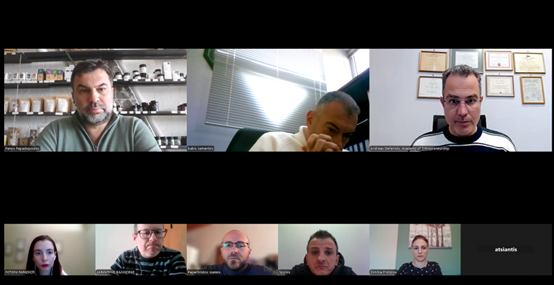As part of the ongoing development of the State-of-the-Art Report on ESG Project Management in Europe within the ESG4PMChange project, the University of Thessaly (UTH) organized a targeted focus group bringing together key stakeholders from academia, public policy, industry, entrepreneurship, and environmental organizations. The event aimed to deepen the shared understanding of ESG Project Management (ESG PM) and Sustainable Project Management (SPM), while also collecting insights to shape future activities and dissemination strategies.
The discussion centered on critical questions such as:
- What challenges do different sectors face in ESG implementation?
- Which interventions are needed to strengthen ESG integration?
- How can HEIs, businesses, and institutions collaborate on ESG competency development?
Through dialogue with experts, the focus group ensured that the project aligns not only with formal deliverables but also with real needs on the ground, paving the way for relevant, impactful, and sector-specific ESG strategies.

Sectoral Diversity Driving Meaningful Insights
The event gathered a diverse panel of participants whose professional backgrounds enriched the discussion and highlighted multidimensional challenges and opportunities in ESG PM and SPM.
- From academia, professors from the University of Thessaly contributed perspectives on translating research into actionable practices, especially in teaching and ESG skill-building.
- A regional project manager brought insights from the policy sector, stressing the role of strong legal frameworks in supporting ESG initiatives at the governmental level.
- The industry voice was represented by a corporate project manager from the food production sector, who emphasized ESG in supply chains and operational planning.
- The entrepreneurship sector was represented by the president of the Academy of Entrepreneurship, linking sustainable business with responsible project management.
- Finally, an environmental expert from OPENFARM underscored the importance of ecological responsibility and innovative approaches to sustainability.
This cross-sectoral setup not only enhanced the discussion but also ensured that ESG is considered from strategic, educational, operational, and ethical perspectives.
The collaboration between HEIs and industry is crucial for building market-oriented certifications and improving ESG competence recognition across sectors.
Future Directions and Commitment to Collaboration
Participants shared strong interest in the ESG4PMChange project’s outcomes, expressing a desire to stay informed and involved. One of the most promising results of the session was the decision to launch a series of sector-specific roundtable discussions. These follow-up initiatives will target the unique needs of education, policy, and industry actors—helping tailor ESG integration plans to each context.
In addition to identifying the need for practical tools to assess ESG competences, participants also emphasized that organizational strategies are often shaped by individual awareness—highlighting the importance of outreach, awareness-raising, and structured capacity-building.

